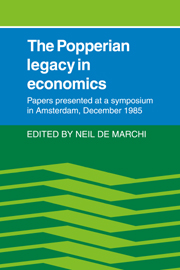Book contents
- Frontmatter
- Contents
- Preface
- List of contributors
- Introduction
- Discussion
- Part I Popper as a philosopher of science
- Part II Popper among the economists
- Part III Falsification and trying to do without it
- Part IV The missing chapter: empirical work and its appraisal
- Part V Non-Popperian perspectives on economics
- 9 The case for pluralism
- 10 Thick and thin methodologies in the history of economic thought
- 11 Economics as discourse
- Index
11 - Economics as discourse
Published online by Cambridge University Press: 05 January 2012
- Frontmatter
- Contents
- Preface
- List of contributors
- Introduction
- Discussion
- Part I Popper as a philosopher of science
- Part II Popper among the economists
- Part III Falsification and trying to do without it
- Part IV The missing chapter: empirical work and its appraisal
- Part V Non-Popperian perspectives on economics
- 9 The case for pluralism
- 10 Thick and thin methodologies in the history of economic thought
- 11 Economics as discourse
- Index
Summary
What I am doing is also persuasion. If someone says, “There is not a difference” and I say, “There is a difference” I am persuading. I am saying, “I don't want you to look at it like that.”
The theme
The determination to speak of economics as discourse signifies interest in the problems of communication in economics. The preferred image is that of economists involved in conversations. Rather than reducing these conversations to a series of statements–the prevalent tendency in talk about economics–we want to observe the multiformity of economic discourse and explore the various arguments, analogies, metaphors, stories, argumentative strategies, and other rhetorical devices that economists use in their conversations. These explorations are intended to illuminate the tensions and conflicts that keep economic discourse alive. They may also uncover different modes within economic discourse and disagreements as problems of communication.
This interest in the communicative aspects of economics implies a paradigmatic shift in the discourse about economics. Issues such as the logical properties of economic theories, criteria for their appraisal, and the scienticity of economics, which have been until now the dominating concern of economic methodologists, lose much of their relevance once we alter our discussion as I am advocating. The leading questions change and so do major concepts.
In this chapter, I am addressing myself primarily to those who got me interested in talking about economics–J.J. Klant, T.W. Hutchison, and Mark Blaug.
- Type
- Chapter
- Information
- The Popperian Legacy in EconomicsPapers Presented at a Symposium in Amsterdam, December 1985, pp. 259 - 278Publisher: Cambridge University PressPrint publication year: 1988
- 6
- Cited by

